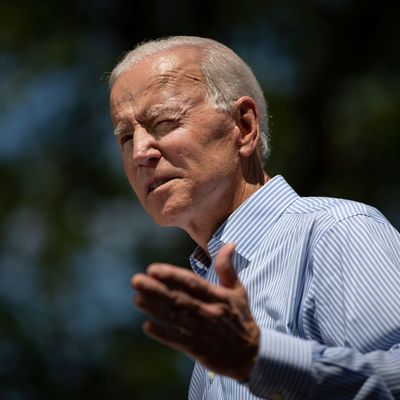
Before a largely African-American crowd in Sumter, South Carolina, former vice-president and current Democratic front-runner Joe Biden apologized for his recent remarks about the “civility” of working with segregationists in his party in the 1970s. But Biden — who developed a reputation as a bit of a non-apologist after a conversation with Anita Hill in April left her “feeling deeply unsatisfied” — offered his comment with a bit of “I’m sorry you feel that way” framing:
Was I wrong a few weeks ago to somehow give the impression to folks that I was praising those people who I opposed time and again? Yes I was. I regret it and I’m sorry for any of the pain and misconception it may have caused to anybody. But for that misstep to define 50 years of my record of fighting racial injustice. That doesn’t represent my record.
For the Biden campaign, his apology will hopefully stop the bleeding of a June 19 shot to the foot, when the former vice-president boasted in a southern accent of the respect he inspired in segregationist James O. Eastland: “He never called me ‘boy,’ he always called me ‘son.’” Besides misunderstanding the racist context of the use of “boy,” the comment brought in volleys of criticism for his relationships with arch-segregationists like senators Eastland and Herman Talmadge. “If those men had their way, I wouldn’t be in the United States Senate and on this elevator right now,” Kamala Harris told ABC News in June.
Worse for Biden’s presidential ambitions were the subsequent looks at his record opposing busing in 1975. Shortly after an early flash of busing-related violence in Boston, Biden supported legislation from North Carolina senator and civil-rights opponent Jesse Helms barring the federal government from enforcing busing. Helms’s amendment did not pass, though Biden did write similar legislation and called busing “an asinine policy.” At the second night of the Democratic debates in June, Kamala Harris called Biden out for his “harmful” language on the segregationists and on his work with them to oppose busing. Harris directed her comments to the vice-president: “There was a little girl in California who was part of the second class to integrate her public schools, and she was bused to school every day. And that little girl was me.”
Harris, who has been the most vocal critic of Biden thus far in the race, did not wholly embrace his half-apology. “He is right to recognize the impact of his words, and I applaud him for doing that,” Harris told reporters in Hartsville, South Carolina, on Saturday. “There is still a point of disagreement between he and I, and that remains … which is the issue of busing.”






























